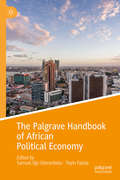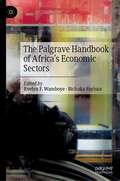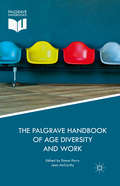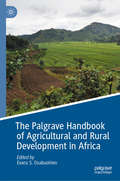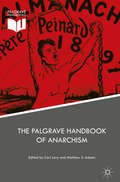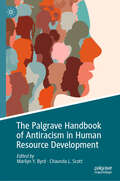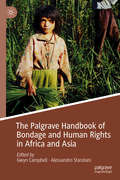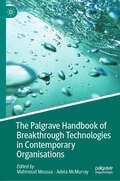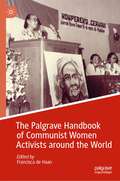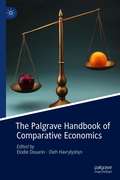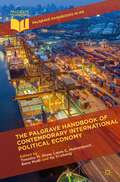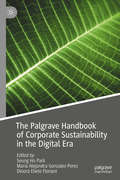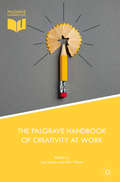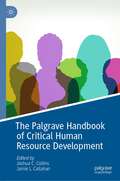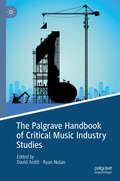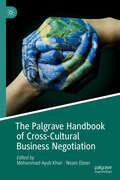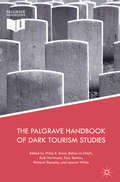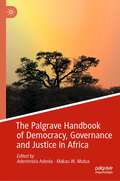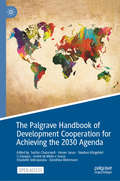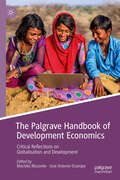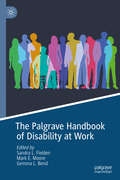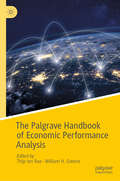- Table View
- List View
The Palgrave Handbook of African Political Economy (Palgrave Handbooks in IPE)
by Toyin Falola Samuel Ojo OloruntobaThis handbook constitutes a specialist single compendium that analyses African political economy in its theoretical, historical and policy dimensions. It emphasizes the uniqueness of African political economy within a global capitalist system that is ever changing and complex. Chapters in the book discuss how domestic and international political economic forces have shaped and continue to shape development outcomes on the continent. Contributors also provoke new thinking on theories and policies to better position the continent’s economy to be a critical global force. The uniqueness of the handbook lies in linking theory and praxis with the past, future, and various dimensions of the political economy of Africa.
The Palgrave Handbook of Africa’s Economic Sectors
by Evelyn F. Wamboye Bichaka FayissaThis handbook provides a reference resource to showcase insightful and nuanced perspectives on Africa’s agriculture, industry, services, and manufacturing sectors; factors affecting the sectors’ competitiveness; and the sectors’ contribution to employment, economic growth, and sustainable development. It also addresses the potential benefits that the sectors could harness from the planned Continental Free Trade Area (CFTA), and in particular how CFTA could increase the efficiency and competitiveness of these sectors.This book provides evidence-based holistic analyses of the past and current state of Africa’s economic sectors, with a strong emphasis on tangible and specific policy recommendations for the purpose of enhancing future economic growth, employment, and sustainable development of the continent. It also assesses the impact of the first-ever Continental Free Trade Area in Africa, and its potential implications for Africa’s integration into regional and global economy and competitiveness relative to other fast developing economies (such as those in Asia). This handbook gives an in-depth analysis of fundamental domestic factors that have relevance on the sectors’ expansion and growth and their contributions to employment, economic growth, and sustainable development in Africa with differential effects across the continent.
The Palgrave Handbook of Age Diversity and Work
by Emma Parry Jean MccarthyThis Handbook incorporates a variety of disciplines and approaches in order to provide a comprehensive and authoritative examination of the issues that result from increasing age diversity at work. Despite interest in this area exploding over the past few years amongst academics, practitioners and policy makers, the analysis of age diversity has remained primarily within disciplinary 'silos' such as Psychology or Sociology with a focus on ageing or generational differences, rather than a combination of approaches to understanding age diversity. Unique in its coverage of multiple perspectives, it considers not only generational and ageing perspectives to age diversity, but also highlights the importance of context in driving both the impact and response to this issue. The Palgrave Handbook of Age Diversity and Work includes contributions from leading scholars in age and generational diversity from across the world, discussing cutting-edge research findings about the nature and impact of age diversity and presenting approaches to managing this phenomenon.
The Palgrave Handbook of Agricultural and Rural Development in Africa
by Evans S. OsabuohienThis handbook examines agricultural and rural development in Africa from theoretical, empirical and policy stand points. It discusses the challenges of the United Nations Sustainable Development Goals (SDGs) and assesses how poverty and other development concerns can be addressed in rural communities through agricultural transformation. Additionally, the handbook extends the Post-2015 Development Agenda and it emphasizes the importance of the agricultural sector as it is closely related to the issues of food sustainability, poverty reduction, and employment creation. The contributors suggest multiple evidence-based policies to develop the rural areas through the transformation of the agricultural sector which can significantly benefit the African continent.
The Palgrave Handbook of Anarchism
by Matthew S. Adams Carl LevyThis handbook unites leading scholars from around the world in exploring anarchism as a political ideology, from an examination of its core principles, an analysis of its history, and an assessment of its contribution to the struggles that face humanity today. Grounded in a conceptual and historical approach, each entry charts what is distinctive about the anarchist response to particular intellectual, political, cultural and social phenomena, and considers how these values have changed over time. At its heart is a sustained process of conceptual definition and an extended examination of the core claims of this frequently misunderstood political tradition. It is the definitive scholarly reference work on anarchism as a political ideology, and should be a crucial text for scholars, students, and activists alike.
The Palgrave Handbook of Anti-Communist Persecutions
by Christian Gerlach Clemens SixThis handbook explores anti-communism as an overarching phenomenon of twentieth-century global history, showing how anti-communist policies and practices transformed societies around the world. It advances research on anti-communism by looking beyond ideologies and propaganda to uncover how these ideas were put into practice. Case studies examine the role of states and non-state actors in anti-communist persecutions, and cover a range of topics, including social crises, capitalist accumulation and dispossession, political clientelism and warfare. Through its comparative perspective, the handbook reveals striking similarities between different cases from various world regions and highlights the numerous long-term consequences of anti-communism that exceeded by far the struggle against communism in a narrow sense. Contributing to the growing body of work on the social history of mass violence, this volume is an essential resource for students and scholars interested to understand how twentieth-century anti-communist persecutions have shaped societies around the world today.Chapter 7 is available open access under a Creative Commons Attribution 4.0 International License via link.springer.com.
The Palgrave Handbook of Antiracism in Human Resource Development
by Marilyn Y. Byrd Chaunda L. ScottThis handbook examines the development of antiracism, the antithesis of racism, in the field of Human Resource Development (HRD) and discusses its relevance to the workplace and higher education. Contributing authors from HRD and HRD-related fields present their perspectives on anti-racism and explain how their framing of anti-racism makes a contribution to HRD research, theory, and practice. Though antiracism is a critical, emerging topic, it has received limited attention in the literature. Its focus is the eradication of racism while delivering justice and emancipation. This collection advances the concept by highlighting ways that research, theory, and practice are shifting the conversation to dismantling and eliminating racism. It shows how racism has traumatized marginalized individuals, limited their participation in the workforce and society, and hindered their psychological well-being. This Handbook is divided into 4 sections: the historical foundations of racism; knowledge derived from research, theory, and lived experiences; practical application of antiracism in educational and workplace settings; and the future of antiracism research. Coming at a time of racial unrest and much discourse on race, this work provides scholars, professionals, and students with a body of research and practical examples that introduces and informs them on the concept of antiracism in HRD. Though the focus is on the US, the arguments put forth in this handbook are not localized, they are universal and can be applied in multiple contexts.
The Palgrave Handbook of Bondage and Human Rights in Africa and Asia
by Alessandro Stanziani Gwyn CampbellIn the West, human bondage remains synonymous with the Atlantic slave trade. But large slave systems in Africa and Asia predated, co-existed, and overlapped with the Atlantic system—and have persisted in modified forms well into the twenty-first century, posing major threats to political and economic stability within those regions and worldwide. This handbook examines the deep historical roots of unfree labour in Africa and Asia along with its contemporary manifestations. It takes an innovative longue durée perspective in order to link the local and global, the past and present. Contributors trace shifting forms of forced labour in the region since circa 1800, connecting punctual shocks such as environmental crisis, conflict, market instability, and crop failure to human security threats such as impoverishment, violence, migration, kidnapping, and enslavement. Together, these chapters illuminate the historical and contemporary dimensions of bondage in Africa and Asia, with important implications for the fight against modern-day bondage and human trafficking.
The Palgrave Handbook of Breakthrough Technologies in Contemporary Organisations
by Mahmoud Moussa Adela McMurrayThis handbook traverses the broad spectrum of ICT management, engaging readers to consider not only the beneficial transformations triggered by these technologies but also the organisational challenges they present. From the disruption brought about by machine learning to the vast opportunities unleashed by the evolution of big data analytics to the revolution of financial technology (FinTech), this handbook offers a thorough and comprehensive journey through the landscape of ICT. The focus is not solely on the breakthrough technologies themselves, but the intricate patterns of their evolution, adoption, management, and the subsequent ripples they create in the organisational fabric. The handbook challenges current views, provokes new insights, and inspires a futuristic view of managing ICT in the ever-evolving business landscape.
The Palgrave Handbook of Communist Women Activists around the World
by Francisca De HaanThis Handbook addresses the role of women in communism as a global, social and political movement for the first time, exploring their lives, forms of activism, political strategies and transnational networks. Comprising twenty-five chapters, based on new and primary research, the book presents the lives of self-identified communist women from a truly international perspective and outlines their struggles against fascism and colonialism, and for women’s emancipation and national liberation. By using the lens of transnational political biography, the chapters capture the broader picture of these women’s lives, unpacking the links between the so-called public and private, the power structures and inequalities of their societies, the formal networks and politics in which they were involved, and the informal connections and friendships that supported their activism both at the national and international level. Challenging androcentric and Eurocentric narratives about communism, this Handbook reveals the active and significant roles of women in nineteenth- and twentieth-century communist movements and regimes, and highlights the importance of communist women in shaping the agenda for women’s rights worldwide.
The Palgrave Handbook of Comparative Economics
by Oleh Havrylyshyn Elodie DouarinThis book aims to define comparative economics and to illustrate the breadth and depth of its contribution. It starts with an historiography of the field, arguing for a continued legacy of comparative economic systems, which compared socialism and capitalism, a field which some argued should have been replaced by institutional economics after the fall of the Berlin Wall. The process of transition to market capitalism is reviewed, and itself exemplifies a new combination of comparative analysis with a focus on institutional development. Going beyond, chapters broadening the application of comparative analysis and applying it to new issues and approaches, including the role and definition of institutions, subjective wellbeing, inequality, populism, demography, and novel methodologies. Overall, comparative economics has evolved in the past 30 years, and remains a powerful approach for analyzing important issues.
The Palgrave Handbook of Consumerism Issues in the Apparel Industry
by Demetris Vrontis Hans Rüdiger Kaufmann Mohammad Fateh Ali Khan PanniThis handbook offers a comprehensive overview of consumerism issues in the textile, apparel and fashion industry, illustrating the impact of consumerism on the sector with a focus on SDG 12: Responsible Consumption and Production. The book presents a synthesis of mainstream and emerging thinking and studies on green, ethical, social and environmental issues. Currently, marketing practices place emphasis on sustainability and social responsibility. Although corporate strategies embrace this notion by claiming to be socially responsible and environmentally friendly, the truth is still debatable. In light of this, scholars and practitioners need to effectively and convincingly respond to consumer concerns on sustainability by adapting their business practices. Split into seven parts, the Handbook covers theoretical challenges on sustainable consumerism in the apparel industry, the influence of sustainable consumerism, conceptual frameworks and cross-cultural consumer behaviour, macro and micro issues, innovative trends, and communication. With discussion of pressing issues such as modern slavery, greenwashing, social media, luxury consumption and sustainable development, the book also illustrates the practical implications from a marketing and production point of view in this sector.
The Palgrave Handbook of Contemporary International Political Economy (Palgrave Handbooks in IPE)
by Timothy M. Shaw Laura C. Mahrenbach Renu Modi Xu Yi-ChongPublished 35 years after Palgrave Macmillan’s landmark International Political Economy (IPE) series was first founded, this Handbook captures the state of the art of contemporary IPE. It draws on the series’ history of focusing on the oft-neglected study of the global South.Providing interdisciplinary perspectives from scholars hailing from the global North and South, the Handbook illustrates the theoretical innovations and empirical richness necessary to explain today’s ever-changing world. This is a world in which the global South and North are not only being transformed by the end of bipolarity and the rise of the BRICS, but also by diverse global crises and growing cross-border challenges. It is a world where human development, governance and security are becoming ever more elusive, where, profoundly altered by the rise of new technologies, the structure of relations between nations itself is changing, becoming increasingly interconnected, both digitally and physically.Understanding these issues is of critical importance to better anticipate current and future global transformations. This Handbook is the ideal primer for all scholars, practitioners and policy makers looking to do so.
The Palgrave Handbook of Contemporary Kenya
by Wanjala S. Nasong’o Maurice N. Amutabi Toyin FalolaThis volume is a bold attempt to address a comprehensive range of themes and issues relating to contemporary Kenya. It covers independent Kenya’s history, society, culture, economics, politics, and environment with great breadth and depth, comprising thirty-four chapters divided into three parts. Part I focuses on independence and the political economy of development, followed by Part II on environment, globalization, gender, and society. Part III examines the external context’s impact and implications for Kenya and the role of Kenya in the global political economy.
The Palgrave Handbook of Corporate Sustainability in the Digital Era
by Seung Ho Park Maria Alejandra Gonzalez-Perez Dinorá Eliete FlorianiThis handbook addresses the intersection between corporate sustainability and digital transformation. It analyzes the challenges and transformations required to be able to have sustainable businesses with a future orientation. Topics include current and potential social, demographic, technological, and managerial trends; the implications of the digital revolution in society and business; as well as the challenges of being sustainable, and profitable. Providing an understanding of the business reasons to incorporate a future orientation into the business strategy, this handbook facilitates an understanding of the need for profound changes in individual behavior, organizational culture, public policy, and business environments to adapt to the accelerated changes and manage business with orientation to the future.
The Palgrave Handbook of Creativity at Work
by Lee Martin Nick WilsonThis Handbook provides authoritative up-to-date scholarship and debate concerning creativity at work, and offers a timely opportunity to re-evaluate our understanding of creativity, work, and the pivotal relationship between them. Far from being a new arrival on the scene, the context of work has always been a place shaped and sharpened by creativity, as well as a site that determines, where, when, how, and for whom creativity emerges. Structured in four parts – Working with Creativity (the present); Putting Creativity to Work (in an organizational context); Working in the Creative Industries (creative labour); and Making Creativity Work (the future) – the Handbook is an inspirational learning resource, helping us to work with creativity in innovative ways. Providing a cutting edge, interdisciplinary, diverse, and critical collection of academic and practitioner insights, this Handbook ultimately conveys a message of hope: if we take better care of creativity, our creativity will better care for us.
The Palgrave Handbook of Critical Human Resource Development
by Joshua C. Collins Jamie L. CallahanThis handbook presents an expansive exploration of critical theory, critical perspectives, critical praxis, and the impact on the research, theory, and practice of Human Resource Development (HRD). Critical Human Resource Development (CHRD) aims to challenge the normative structures, practices, policies, definitions, and approaches which have historically dominated the field of Human Resource Development (HRD). As an approach to HRD, CHRD raises awareness of social systems, organizational policies and practices, and research paradigms that silence new ways of knowing and understanding, while advancing underrepresented and emerging approaches. Through an analysis of power and privilege, morality and ethics, and ideology and context, CHRD situates diversity, equity, inclusion, social justice, and resistance as a path forward in a rapidly-changing global society. In contrast to HRD’s traditional focus on organization development, training and development, and career development, this handbook adopts a more critical vantage point which classifies the scope and outcomes of HRD across five domains identified by CHRD scholars as key to understanding the nature and work of the field— organizing, relating, learning, changing, and advocating.
The Palgrave Handbook of Critical Music Industry Studies
by David Arditi Ryan NolanThe Handbook of Critical Music Industry Studies provides students and researchers with the means to think about how the performance, recording, and publishing of music could be if we do things differently. People are hungry for a more equitable music performance and recording system. The industry exudes patriarchy, white supremacy, cultural imperialism, ableism, and worker exploitation. In the context of gendered (e.g., #MeToo and #TimesUp) and racialized (e.g., Black Lives Matter) inequity, rampant precarity and casualization, and modes of musical dissemination that are changing faster than policymakers and regulatory bodies can keep up with, the timing for assembling such an interdisciplinary collection could not be more appropriate. Essays in this handbook will tackle power structures at root in the music industry and the academic study of the field. Topics covered include the politics of representation and power in the global music industries, the labor of music, music as media (including data and algorithmic culture), and copyright/intellectual property, among others.
The Palgrave Handbook of Cross-Cultural Business Negotiation
by Mohammad Ayub Khan Noam EbnerGlobal business management issues and concerns are complex, diverse, changing, and often intractable. Industry actors and policy makers alike rely upon partnerships and alliances for developing and growing sustainable business organizations and ventures. As a result, global business leaders must be well-versed in managing and leading multidimensional human relationships and business networks – requiring skill and expertise in conducting the negotiation processes that these entail. After laying out a foundation justifying the importance of studying negotiation in a global context, this book will detail conventional and contemporary theories regarding international engagement, culture, cultural difference, and cross-cultural interaction, with particular focus on their influence on negotiation. Building on these elements, the book will provide a broad array of country-specific chapters, each describing and analyzing the negotiation culture of businesspeople in a different country around the world. Finally, the book will look ahead, with an eye towards identifying and anticipating new trends and developments in the field of global negotiation. This text will appeal to scholars and researchers in international business, cross-cultural studies, and conflict management who seek to understand the challenges of intercultural communication and negotiation. It will provide trainers and consultants with the insights they need to prepare their clients for intercultural negotiation. Finally, the text will appeal to businesspeople who find themselves heading out to engage with counterparts in another country, or operating in other multinational environments on a regular basis.
The Palgrave Handbook of Dark Tourism Studies
by Richard Sharpley Philip R. Stone Leanne White Rudi Hartmann Tony SeatonThis handbook is the definitive reference text for the study of ‘dark tourism’, the contemporary commodification of death within international visitor economies. Shining a light on dark tourism and visitor sites of death or disaster allows us to better understand issues of global tourism mobilities, tourist experiences, the co-creation of touristic meaning, and ‘difficult heritage’ processes and practices. Adopting multidisciplinary perspectives from authors representing every continent, the book combines ‘real-world’ viewpoints from both industry and the media with conceptual underpinning, and offers comprehensive and grounded perspectives of ‘heritage that hurts’. The handbook adopts a progressive and thematic approach, including critical accounts of dark tourism history, dark tourism philosophy and theory, dark tourism in society and culture, dark tourism and heritage landscapes, the ‘dark tourist’ experience, and the business of dark tourism. The Palgrave Handbook of Dark Tourism Studies will appeal to students and scholars with an interest in aspects of memorialisation and morality in sociology, death studies, history, geography, cultural studies, philosophy, psychology, business management, museology and heritage tourism studies, politics, religious studies, and anthropology.
The Palgrave Handbook of Democracy, Governance and Justice in Africa
by Aderomola Adeola Makau W. MutuaThere is an emerging consensus that what is projected as democratic governance and justice in Africa requires a re-calibration, in particular, in relation to the constitutive demos, human rights, the realisation of commitments at various governance levels and the convergence between these ideations. The post-colonial narrative on democracy has unveiled some crevices in rule of law, political equality, political participation, political culture and freedom of the press. Aside from the fact that these notions are threatened by some existing institutional structures, these notions are increasingly being negotiated across political spaces. Evident in the prevalent narrative is an imperative for Africa to assert its place on the global scene of democratic governance and justice. However, if this will be accomplished, it is important to understand some of the issues that need to be worked through in this transition.
The Palgrave Handbook of Development Cooperation for Achieving the 2030 Agenda: Contested Collaboration
by Sachin Chaturvedi Heiner Janus Stephan Klingebiel Xiaoyun Li André de Mello e Souza Elizabeth Sidiropoulos Dorothea WehrmannThis open access handbook analyses the role of development cooperation in achieving the 2030 Agenda in a global context of ‘contested cooperation’. Development actors, including governments providing aid or South-South Cooperation, developing countries, and non-governmental actors (civil society, philanthropy, and businesses) constantly challenge underlying narratives and norms of development. The book explores how reconciling these differences fosters achievement of the Sustainable Development Goals.
The Palgrave Handbook of Development Economics: Critical Reflections on Globalisation and Development
by José Antonio Ocampo Machiko NissankeThis Handbook responds to the needs and aspirations of current and future generations of development economists by providing critical reference material alongside or in relation to mainstream propositions. Despite the potential of globalisation in accelerating growth and development in low and middle-income countries through the spread of technology, knowledge and information, its current practice in many parts of the world has led to processes that are socially, economically and politically and ecologically unsustainable. It is critical for development economists to engage with the pivotal question of how to change the nature and course of globalisation to make it work for inclusive and sustainable development. Applying a critical and pluralistic approach, the chapters in this Handbook examine economics of development paths under globalisation, focusing on sustainable development in social, environmental, institutional and political economy dimensions. It aims at advancing the frontier of development economics in these key aspects and generating more refined policy perspectives. It is critically reflective in examining effects of globalisation on development paths to date, and in terms of methodological and analytical approaches, as well as forward-thinking in policy perspectives with a view to laying a foundation for sustainable development.
The Palgrave Handbook of Disability at Work
by Mark E. Moore Sandra L. Fielden Gemma L. BendThis scholarly handbook covers all aspects of people with disabilities entering the workplace, including the legal aspects, transitions, types, and levels of employments, the impact of different disabilities, and the consideration of the intersection of disability with other identities such as gender and ethnicity. Comprehensive in scope, chapters look beyond organizational strategies that accommodate an employee’s disability and use case studies to highlight important issues and the individual’s perspective. The handbook concludes with a reflection on the work included in the book, what was not included and why, and makes recommendations for future disability research. Marking a major contribution to the study of workplace diversity and bringing together academics from various disciplines and global regions, this handbook covers a truly broad and diverse mix of approaches, theories, and models.
The Palgrave Handbook of Economic Performance Analysis
by Thijs Ten Raa William H. GreeneThis Handbook takes an econometric approach to the foundations of economic performance analysis. The focus is on the measurement of efficiency, productivity, growth and performance. These concepts are commonly measured residually and difficult to quantify in practice. In real-life applications, efficiency and productivity estimates are often quite sensitive to the models used in the performance assessment and the methodological approaches adopted by the analysis. The Palgrave Handbook of Performance Analysis discusses the two basic techniques of performance measurement – deterministic benchmarking and stochastic benchmarking – in detail, and addresses the statistical techniques that connect them. All chapters include applications and explore topics ranging from the output/input ratio to productivity indexes and national statistics.
